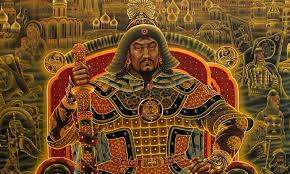Batu and Guyuk
In December 1241, Khan Ugedei died. All power was concentrated in the hands of his wife and regent Doregene (Turakin in Russian sources).
Doregene wanted to transfer power to her son Guyuk. But while Chagatai was alive, Doregene could not do this, since Ugedei, on his deathbed, left clear instructions that the heir would be one of the grandsons of his son Kuju. One such grandson was Shiremun, who was distinguished by his abilities in state administration.
Only after Chagatai’s death, six months after Ugedei’s, was Doregene able to carry out her plan. She subjected many of Genghis Khan’s dignitaries to repression. Those whom she could not repress, she persecuted. For example, Ugedei’s senior wife, Moke Khatun.
Batu treated Doregene with indifference, but he did not antagonize her. He knew that despite her desire to make the hated Guyuk kagan, she primarily wanted to remain his “gray cardinal.” In turn, the regent needed Batu’s passivity, as he did not interfere in matters of succession.
In 1246, a kurultai was finally held to decide who would be kagan. Batu did not attend, citing illness in his legs. Instead, he sent his brothers Orda, Shiban, Berke, Berkechar, Tangut, and Tuga-Timur.
Güyük was elected kagan.
Güyük immediately pursued a hostile policy against Batu. He reassigned all of his appointees in Asia Minor, Georgia, and Rus. Thus, instead of Alexander Nevsky, his brother Andrei became the Grand Prince of Vladimir.

Andrei on the Vladimir throne
Since Batu himself did not intend to pay homage to Guyuk, the latter, ostensibly to visit his relative, set off for his domain with a large army. But he died near Samarkand. He may have been poisoned.
Coup
After Guyuk’s death, his wife, Ogul-Gaimish, became regent.
Taking advantage of her inability to act as head of state, Batu convened a kurultai in his lands in 1249. He proposed Tolui’s son, Munkhe, as khan. Thus, the Ugedeids were removed from power. Batu himself, despite being offered the throne of khan, refused to rule. His own lands were enough for him.
Since the Kurultai of 1249 was preliminary, the main Kurultai was convened in Karakorum in 1251. At it, Munkhe’s candidacy was finally approved. He became khan.
After ascending the throne, Munkhe was the first among the Chingizids to carry out large-scale repressions among the descendants of Genghis Khan.
In 1252, Batu deposed Guyuk’s protégé, Andrei Yaroslavich. He sent the so-called Nevryuev army to Rus. Andrei was defeated, and the family of his brother Yaroslav Yaroslavich, who had spoken out in his defense, was killed. Pereyaslavl-Zalessky was burned down. Alexander Nevsky became Grand Prince of Vladimir again. Andrei fled to the Swedes.
At the same time, Oleg Ingvarovich Krasny was imprisoned in Ryazan. He spent 14 years in Horde captivity. Apparently, he was thoroughly indoctrinated.
Khan’s father
After his accession, Munkhe gave Batu the title of “Khan’s father.” That is, he formally recognized him as his senior relative (but not ruler). In reality, Batu received full power over his ulus.
He also gained control over Iran, Asia Minor, and the lands of the Chagataiids in Central Asia. Batu’s protégés were installed everywhere.
Batu acquired the right to issue his own decrees. Under him, a large number of them were issued, which made it possible to codify many legal norms that were not mentioned in Genghis Khan’s Great Yasa. This simplified many issues, such as trade with foreign countries, the status of Muslims and Christians, and the recruitment of non-Mongols into service.

The last years
However, cracks immediately began to appear in the relationship between Munkhe and Batu. In 1253, preparations began for the Mongol campaign in the Middle East.
This was not beneficial for Batu, as his ulus had mutually beneficial trade relations with the Middle East. Moreover, the main population of the center of his possessions in Volga Bulgaria was Muslim. Berke’s brother, who was himself a devout Muslim, was particularly opposed to the campaign:
“We raised Menguqan, and how does he repay us for this? By repaying us with evil against our friends, violating our agreements, despising our client, and encroaching on the possessions of the caliph, that is, my ally, with whom I correspond and have bonds of friendship. There is something vile in this.”
As a result, Batu was in no hurry to assemble troops for the campaign. This delayed its start by three years.
In response, Mengu’s officials conducted a census in the ulus of Jochi. This was an insult, as it showed that Batu was not trusted. He endured it, as he did not want to allow open confrontation. Moreover, he sent his son Sartak to Karakorum, who was not a very good commander but showed political acumen. Sartak was able to win Munkhe’s favor.
When Sartak was in Karakorum, Batu died. The cause of death was rheumatoid arthritis, a disease common among his maternal relatives, the Kungirats.
Thus ended the life of a great man who saw the purpose of life not in military campaigns, but in the peaceful development and improvement of conquered lands. To this end, he committed terrible deeds, destroying everyone—his Mongol relatives, the rebellious Russian princes, and the Polovtsian khans. But in the memory of the people, he remained Batu—the father-commander.
